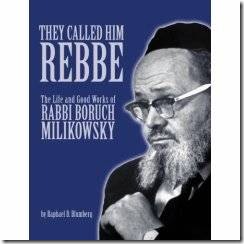
Jerusalem: Urim Publications; December, 2007.
295 pages
Amazon Link
I have always admired successful immigrant rabbis, men who arrived on American shores during and after the Nazi era, poor, grieving, and with no knowledge of the English language or American culture but who managed to break through all of those barriers to touch the lives of others. The stories of those who overcame so much, emerging from hell to win the hearts and minds of a new and foreign generation, stand as triumphs of human spirit that can continue to enlighten and inspire long after they pass on.
My appreciation for this genre has only deepened in recent years, when I became an ‘immigrant rabbi’ myself, moving from the United States to Israel and facing the difficulties of adjusting to a new culture, albeit without fresh memories of a Holocaust and with inestimable material advantages. It has made me think about the challenges that my own grandfather faced upon his arrival in Baltimore in 1947 with my grandmother and their three children. I stand in awe of his struggle to establish his shteebl while working as a shochet, mohel, chazzan, and assorted other religious capacities (he was a ‘Swiss-army Jew’, as I like to call it).
Raphael Blumberg’s They Called Him Rebbe: The Life and Good Works of Rabbi Boruch Milikowsky (Urim, 2007) carried a special resonance for me. Most of the book is set in Baltimore, my hometown and my parents’ hometown, and in its Talmudical Academy (TA), my alma mater. Its ‘characters’ – students of Rabbi Milikoswky and graduates of TA from the 50s into the 80s - are familiar as longstanding members of the Baltimore community, as friends of my father (who was in Rabbi Milikosky’s shiur in 1962-3), and as figures well-known throughout the Jewish world (but who may be a bit better known to those who take interest in remembering who has Baltimore roots). Its event – both the comic and the tragic – remain part of Baltimore’s collective Jewish memory until today.
One might get the impression that this book would only interest vintage Jewish Baltimoreans, who smile at the mention of Cottage Avenue or Old Court Road as they would at the names Wes Unseld or Cal Ripken. In fact, however, the book should attract broad interest specifically because of its unique setting, and not despite it. Rabbi Milikowsky’s successful adaptation to the peculiar culture of that particular school, in that particular city, and in those particular years contain a universal message of love and devotion, and their ability to bridge between even the most disparate of cultures.
Rabbi Milikowsky, a native of White Russia, studied in some of Europe’s great prewar Yeshivos, ultimately fleeing from Lithuania to occupied Shanghai as a student of the Mir Yeshiva. Soon after his arrival in the United States after the war, he became a Rebbe at TA, where he remained until his passing in 1990. When he arrived at TA in the late 1940s, it had recently added a high school. Although it had been in existence for 30 years by then, it remained one of a small handful of Jewish day schools outside of New York. As such, its student body included a wide variety of local students and ‘out-of-towners’, immigrants and ‘Yankees’, from observant families and from traditional but non-observant families, and with a broad range of talents and abilities.
Thrown into such a situation with a strong yeshiva background but no formal training, Rabbi Milikowsky used whatever means he had at his disposal to communicate with his students. The author recounts (p. 87):
…there was a concentration of good ball players amongst the non-observant boys. During recess the boys would go outside and play softball on the T.A. asphalt lot. At some point Rabbi Milikowsky asked how to play and joined in some of the games with the eighth graders. If he could not communicate verbally with some of the weaker boys, he could at least communicate nonverbally.
Yet, on the very same page, the author includes an anecdote which many readers would view negatively, as characteristic of a worldview not shared by contemporary pupils and one that is potentially damaging to their religious development:
There was a boy, not so observant, who was creating problems for the class and for Rabbi Milikowsky. One time, in a fit of anger, he threw a chumash on the floor. Rabbi Milikowsky got very upset and castigated him about how this was a forbidden, dangerous thing to do. The next day the boy was taken to the hospital for an emergency appendectomy. The students of Rabbi Milikowsky’s eighth-grade class took this as an omen about their own behavior. Rabbi Milikowsky didn’t have to say a word.
The startling juxtaposition of these two stories captures the tension of an old-world rabbi trying to forge relationships with new-world students. Other practices of Rabbi Milikowsky’s that would be frowned on today include smoking in front of students, turning a blind eye to students who smoke, and mild corporal punishment (including a story on p. 147 of a student who complained to his father that Rabbi Milikowsky hit him with a broom, whereupon the father presented the rabbi with a belt, in case his son ever deserved another beating). To his credit, the author makes very few attempts to minimize or contextualize these stories (he also does not airbrush a larger hair-covering or longer sleeves onto pictures of Mrs. Leah Milikowsky).
This book has little to offer in terms of formal pedagogy. Its subject never trained to be a classroom teacher and may have never prepared a lesson plan. Of all the praise found in this book, next to nothing of his teaching style or skill is offered. His students did not pay tribute by acknowledging that he taught them to learn Gemara or read Rashi. Rather, the book emphasizes the relationships that he built with his students, the informal classroom moments where he would allow students to discuss whatever topics were on their minds, his availability to them at all hours, his willingness to spend Shabbat and Yom Tov in the T.A. dormitory long after he had retired as the dormitory’s mashgiach, his presence in the school’s Beit Midrash and on school trips, and his mussar shmuessen (lectures on ethics).
The author pays special attention to the way that Rabbi Milikowsky treated each student individually (pp. 142-146, 182, et al), tailoring his responses to the needs of each student. In the 1960s, when desegregation began in the American South (which the author often erroneously calls ‘South America’), T.A. accepted many students from southern cities, Atlanta in particular. As dormitory students, Rabbi Milikowsky was directly responsible for them. The book recounts how he tried to understand their background and ease them into a life of observance. Other anecdotes describe his relationship with a poor student who was diagnosed with ADD later in life (pp. 176-180) and how he dealt with the issue of students who were seeing girls (pp. 142, 228). His concern for everything going on in the lives of his students coupled with a grounded, common-sense approach with how to deal with them finds expression both in the numerous stories and in witticisms like “Treat them like adults – expect them to act like babies” (p. 272).
Another element of Rabbi Milikowsky’s personality highlighted by the book is a profound openness to different types of learning and ways of thinking. The book illustrates the way he approached women’s Jewish learning (indeed, his daughter, Rabbanit Malke Bina, founded MaTaN, a major institution of higher women’s Jewish learning), academic Jewish studies (his son Chaim is a professor of Talmud at Bar Ilan University), Zionism (p. 253), Haskalah Literature (p. 252), and American patriotism (p. 208).
In general, the book does a good job of arranging numerous brief stories into a chronological whole. The reader comes away with a sense of the man and the trajectory of his life. Nevertheless, it often reads life a tribute by his favorite students. A small handful of the hundreds of students who sat in his classroom or lived in his dormitory are profiled. Perhaps more attention should have been paid to students who were not amongst ‘Rebbe’s boys’, in order to complete the picture of this fascinating personality.

